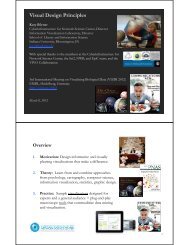Envisioning Knowledge (and Expertise) - IVL - Indiana University
Envisioning Knowledge (and Expertise) - IVL - Indiana University
Envisioning Knowledge (and Expertise) - IVL - Indiana University
You also want an ePaper? Increase the reach of your titles
YUMPU automatically turns print PDFs into web optimized ePapers that Google loves.
Scholars Have Different Roles/Needs<br />
Researchers <strong>and</strong> Authors—need to select promising p gresearch topics, p , students, , collaborators, ,<br />
<strong>and</strong> publication venues to increase their reputation. They benefit from a global view of<br />
competencies, reputation <strong>and</strong> connectivity of scholars; hot <strong>and</strong> cold research topics <strong>and</strong><br />
bursts of activity, <strong>and</strong> funding available per research area.<br />
Editors—have to determine editorial board members, assign g papers p p to reviewers, <strong>and</strong><br />
ultimately accept or reject papers. Editors need to know the position of their journals in<br />
the evolving world of science. They need to advertise their journals appropriately <strong>and</strong><br />
attract high-quality submissions, which will in turn increase the journal’s reputation <strong>and</strong><br />
lead to higher quality submissions.<br />
RReviewers—read, i d critique, i i <strong>and</strong> d suggest changes h to hhelp l iimprove the h quality li of fpapers <strong>and</strong> d<br />
funding proposals. They need to identify related works that should be cited or<br />
complementary skills that authors might consider when selecting project collaborators.<br />
Teachers—teach classes, train doctoral students, <strong>and</strong> supervise postdoctoral researchers. They<br />
need to identify key works, works experts, experts <strong>and</strong> examples relevant to a topic area <strong>and</strong> teach them<br />
in the context of global science.<br />
Inventors—create intellectual property <strong>and</strong> obtain patents, thus needing to navigate <strong>and</strong> make<br />
sense of research spaces as well as intellectual property spaces.<br />
Investigators Investigators—scholars scholars acquire funding to support students students, hire staff staff, purchase equipment, equipment<br />
or attend conferences. Here, research interests <strong>and</strong> proposals have to be matched with<br />
existing federal <strong>and</strong> commercial funding opportunities, possible industry collaborators <strong>and</strong><br />
sponsors.<br />
Team Leads <strong>and</strong> Science Administrators Administrators—many many scholars direct multiple research projects<br />
simultaneously. Some have full-time staff, research scientists, <strong>and</strong> technicians in their<br />
laboratories <strong>and</strong> centers. Leaders need to evaluate performance <strong>and</strong> provide references for<br />
current or previous members; report the progress of different projects to funding agencies.



